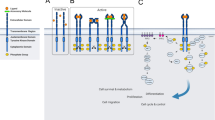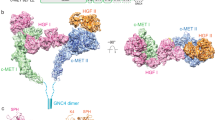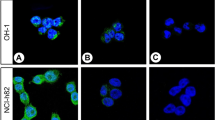Abstract
GROWTH factor receptors with protein tyrosine kinase activity are central to the control of proliferation of both normal and malignant cells1–3. Using anti-phosphotyrosine antibodies4, we have previously identified a transmembrane glycoprotein with abnormally high protein tyrosine kinase activity in a human gastric tumour cell line (GTL-16)5,6. Electrophoresis under non-reducing conditions revealed that this kinase (relative molecular mass 145,000 (145 K)) is disulphide-linked to a 50K chain in an αβ-complex of 190K (p190). From its novel two-chain structure, we deduced that p190 was the prototype of a new class of tyrosine kinase receptors. We now show that p190 is indistinguishable from the protein encoded by the c-met protooncogene and that the αβ-subunit structure is conserved in other human cell lines. We also show that the high level of p190 found in the GTL-16 cell line is accompanied by amplification and overexpression of c-met. This provides the first example of a functional alteration of c-met in a human tumour cell line.
This is a preview of subscription content, access via your institution
Access options
Subscribe to this journal
Receive 51 print issues and online access
$199.00 per year
only $3.90 per issue
Buy this article
- Purchase on Springer Link
- Instant access to full article PDF
Prices may be subject to local taxes which are calculated during checkout
Similar content being viewed by others
References
Yarden, Y. & Ullrich, A. A. Rev. Biochem. 57, 443–478 (1988).
Waterfield, M. D. Br. Med. Bull. (in the press).
Hanks, S. K., Quinn, A. M. & Hunter, T. Science 241, 42–52 (1988).
Comoglio, P. M. et al. EMBO J. 3, 483–489 (1984).
Giordano, S., Di Renzo, M. F., Ferracini, R., Chiado'-Piat, L. & Comoglio, P. M. Molec. cell. Biol. 8, 3510–3517 (1988).
Giordano, S. et al. J. cell. Biochem. 38, 229–236 (1988).
Chan, A. M. L. et al. Oncogene 2, 593–600 (1988).
Tempest, P. R., Stratton, M. R. & Cooper, C. S. Br. J. Cancer 58, 1–7 (1988).
Park, M. et al. Proc. natn. Acad. Sci. U.S.A. 84, 6379–6383 (1987).
Cooper, C. S. et al. Nature 311, 29–33 (1984).
Dean, M. et al. Nature 318, 385–388 (1985).
Park, M. et al. Cell 45, 895–904 (1986).
Di Renzo, M. F., Ferracini, R., Naldini, L., Giordano, S. & Comoglio, P. M. Eur. J. Biochem. 158, 383–391 (1986).
Cleveland, D., Fischer, S. G., Kirschner, M. W. & Laemmli, U. K. J. biol. Chem. 252, 1102–1106 (1977).
Hunter, T. & Sefton, B. M. Proc. natn. Acad. Sci. U.S.A. 77, 1311–1315 (1980).
Author information
Authors and Affiliations
Rights and permissions
About this article
Cite this article
Giordano, S., Ponzetto, C., Renzo, M. et al. Tyrosine kinase receptor indistinguishable from the c-met protein. Nature 339, 155–156 (1989). https://doi.org/10.1038/339155a0
Received:
Accepted:
Issue Date:
DOI: https://doi.org/10.1038/339155a0
This article is cited by
-
Molecular pathways, resistance mechanisms and targeted interventions in non-small-cell lung cancer
Molecular Biomedicine (2022)
-
Management and Treatment of Non-small Cell Lung Cancer with MET Alteration and Mechanisms of Resistance
Current Treatment Options in Oncology (2022)
-
The AKT-independent MET–V-ATPase–MTOR axis suppresses liver cancer vaccination
Signal Transduction and Targeted Therapy (2020)
-
The multiple paths towards MET receptor addiction in cancer
Oncogene (2018)
-
MET overexpression and gene amplification: prevalence, clinico-pathological characteristics and prognostic significance in a large cohort of patients with surgically resected NSCLC
Virchows Archiv (2017)
Comments
By submitting a comment you agree to abide by our Terms and Community Guidelines. If you find something abusive or that does not comply with our terms or guidelines please flag it as inappropriate.



